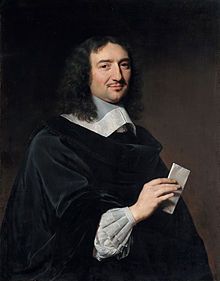Jean-Baptiste Colbert
|
Jean-Baptiste Colbert Lord of Vandières and Cernay |
|
|---|---|

Portrait of Jean-Baptiste Colbert, by Philippe de Champaigne (1655)
|
|
| Chief Minister of the French Monarch | |
|
In office 9 March 1661 – 6 September 1683 |
|
| Monarch | Louis XIV |
| Preceded by | Jules Raymond Mazarin |
| Succeeded by | Vacant (1683–1715) Guillaume Dubois |
| Secretary of the Navy | |
|
In office 7 March 1669 – 6 September 1683 |
|
| Monarch | Louis XIV |
| Succeeded by | Jean-Baptiste Colbert, Jr. |
| Controller-General of Finances | |
|
In office 4 May 1661 – 6 September 1683 |
|
| Monarch | Louis XIV |
| Preceded by | Nicolas Fouquet |
| Succeeded by | Claude Le Peletier |
| Secretary of State of the Maison du Roi | |
|
In office 1664 – 6 September 1683 |
|
| Monarch | Louis XIV |
| Preceded by | Antoine de Ratabon |
| Succeeded by | François-Michel le Tellier |
| Personal details | |
| Born |
29 August 1619 Reims, France |
| Died | 6 September 1683 (aged 64) Paris, France |
| Resting place | Saint-Eustache, Paris |
| Nationality | French |
| Spouse(s) | Marie Charron (m. 1648; d. 1683) |
| Children |
Jean-Baptiste Jacques Nicolas Jean-Jules-Armand |
| Religion | Roman Catholicism |
| Nickname(s) |
Le Grand Colbert (The Great Colbert) |
| Academic career | |
| Institution |
French Monarchy Académie française Académie royale d'architecture French Academy of Sciences |
| Field |
Economics Military science Architecture |
| School or tradition |
Mercantilism |
| Influences | |
| Influenced | |
| Contributions | Colbertism |
| Awards | Order of the Holy Spirit |
Jean-Baptiste Colbert (French: [ʒɑ̃.ba.tist kɔl.bɛʁ]; 29 August 1619 – 6 September 1683) was a French politician who served as the Minister of Finances of France from 1665 to 1683 under the rule of King Louis XIV. His relentless hard work and thrift made him an esteemed minister. He achieved a reputation for his work of improving the state of French manufacturing and bringing the economy back from the brink of bankruptcy. Historians note that, despite Colbert's efforts, France actually became increasingly impoverished because of the King's excessive spending on wars. Colbert worked to create a favourable balance of trade and increase France's colonial holdings.
Colbert's market reforms included the foundation of the Manufacture royale de glaces de miroirs in 1665 to supplant the importation of Venetian glass (forbidden in 1672, as soon as the French glass manufacturing industry was on sound footing) and to encourage the technical expertise of Flemish cloth manufacturing in France. He also founded royal tapestry works at Gobelins and supported those at Beauvais. Colbert worked to develop the domestic economy by raising tariffs and by encouraging major public works projects. Colbert also worked to ensure that the French East India Company had access to foreign markets, so that they could always obtain coffee, cotton, dyewoods, fur, pepper and sugar. In addition, Colbert founded the French merchant marine.
...
Wikipedia
